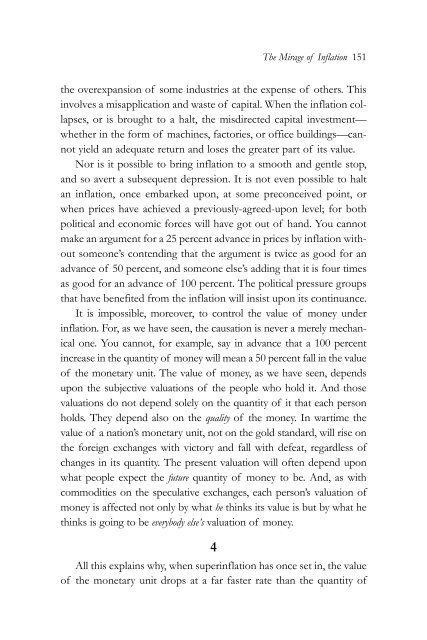1gDdM7w
1gDdM7w
1gDdM7w
- No tags were found...
Create successful ePaper yourself
Turn your PDF publications into a flip-book with our unique Google optimized e-Paper software.
The Mirage of Inflation 151the overexpansion of some industries at the expense of others. Thisinvolves a misapplication and waste of capital. When the inflation collapses,or is brought to a halt, the misdirected capital investment—whether in the form of machines, factories, or office buildings—cannotyield an adequate return and loses the greater part of its value.Nor is it possible to bring inflation to a smooth and gentle stop,and so avert a subsequent depression. It is not even possible to haltan inflation, once embarked upon, at some preconceived point, orwhen prices have achieved a previously-agreed-upon level; for bothpolitical and economic forces will have got out of hand. You cannotmake an argument for a 25 percent advance in prices by inflation withoutsomeone’s contending that the argument is twice as good for anadvance of 50 percent, and someone else’s adding that it is four timesas good for an advance of 100 percent. The political pressure groupsthat have benefited from the inflation will insist upon its continuance.It is impossible, moreover, to control the value of money underinflation. For, as we have seen, the causation is never a merely mechanicalone. You cannot, for example, say in advance that a 100 percentincrease in the quantity of money will mean a 50 percent fall in the valueof the monetary unit. The value of money, as we have seen, dependsupon the subjective valuations of the people who hold it. And thosevaluations do not depend solely on the quantity of it that each personholds. They depend also on the quality of the money. In wartime thevalue of a nation’s monetary unit, not on the gold standard, will rise onthe foreign exchanges with victory and fall with defeat, regardless ofchanges in its quantity. The present valuation will often depend uponwhat people expect the future quantity of money to be. And, as withcommodities on the speculative exchanges, each person’s valuation ofmoney is affected not only by what he thinks its value is but by what hethinks is going to be everybody else’s valuation of money.4All this explains why, when superinflation has once set in, the valueof the monetary unit drops at a far faster rate than the quantity of


